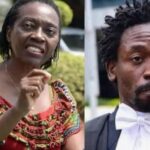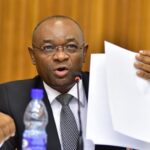The Supreme Court has dismissed an appeal by businessman Hassan Basajjabalaba that was challenging the orders of the Constitutional Court to have him and his brother tried for conspiring to defeat tax laws.
In a majority judgement of six Judges against one, the Supreme Court has ruled that it didn’t find merit in the appeal implying that Hassan Basajjabalaba and his brother Muzamiru Basajjabalaba have to face trial in the Anti-Corruption Court. This is on charges of forgery of a judicial document, uttering a false document and conspiring to evade tax of sh20 billion.
The sh20 billion tax that was not paid by the duo stems from the decision by the government to cancel Basajjabalaba’s lease contracts to develop five Kampala city markets out of which he was compensated sh142 billion for the loss caused to him about 11 years ago.
As a result, a concerned citizen instituted private criminal proceedings at Buganda Road Magistrates Court accusing Basajjabalaba and Muzamiru of having failed to pay taxes arising from the aforementioned compensations. Consequently, the two brothers were summoned to court, charged and released on bail.
They were each asked to deposit sh30 million cash and Basajjabalaba was asked to deposit his passport to court. But he later obtained it to travel to Nairobi.
However, Basajjabalaba was reportedly intercepted at Entebbe International Airport and detained incommunicado at Kireka Special Investigations Unit of Police and; on January 16, 2015, he was produced at the Anti-Corruption Court where he was charged with similar charges to those that he had already been charged with at Buganda Road Court.
But the parallel proceedings at Buganda Road Court continued taking place reportedly without their notice and they were later discontinued by the Director of Public Prosecutions – DPP.
At Anti-Corruption Court, the group was charged afresh and remanded to Luzira before being asked to deposit a combined total of 100 million shillings cash for them to be given bail again which was also later cancelled.
As a result, the brothers decided to petition the Constitutional Court raising a number of grounds that included that the DPP acted illegally and irregularly by withdrawing charges against them at Buganda Road Court in their absence.
They also noted that their bail had been cancelled before they could be heard which violated their constitutional right to fair hearing adding that the bail monies were also excessive. As such, they asked the Constitutional Court to declare the acts by the DPP as illegal.
However, the Constitutional Court Judges ruled that there were violations during the initial stages of the duo’s prosecution, but they declined to declare the charges against them in the Anti-Corruption Court as illegal.
Instead, the Judges directed the Registrar to transfer the file back to Anti-Corruption Court such that Basajjabalaba and Muzamiru’s trial can resume immediately.
But the brothers appealed in the Supreme Court on grounds that the learned Judges of the Constitutional Court erred in law and fact when they delivered a judgement in the petition, yet three out of the four Judges who signed on the Judgement had since vacated the Constitutional Court, which they said rendered their Judgement a nullity.
The judgement was delivered on May 2nd 2018 and four out of the five Coram members namely Justices Opio Aweri, Eldard Mwangushya, Steven Kavuma and Solomy Barungi Bbosa were no longer members of the Constitutional Court. The Judgement had been delivered by Justice Remmy Kasule who was the only remaining Justice of the Coram that heard the petition.
As such, Basajjabalaba and Muzamiru asked the Supreme Court to declare the Judgement by the Constitutional Court invalid and declare their trial as illegal.
However, in a judgement dated November 19th 2021, the Supreme Court comprising of Judges Ezekiel Muhanguzi, Faith Mwondha, Stella Arach Amoko, Mike Chibita, Professor Lillian Tibatemwa and Percy Night Tuhaise have dismissed the petition while Dr Esther Kisakye who led the panel has dissented.
The Judges note that the reason which can prevent the Judge who wrote and signed the judgement to deliver it in person is not a factor to apply and therefore it is immaterial that the judge is prevented by death or retirement, provided that the time of writing and signing the judgement, the judge was a member of the court.
“We say this because in our view, much as the date of delivery is the day it takes effect, it is not the day the decision is made. We think neither the interest of justice nor public policy would demand that a decision of five Judges be invalidated because one of the judges who participated in the decision retired or died before the decision was pronounced”, reads the lead Judgement written by Justice Mwondha.
Considering the precedents of the Supreme Court, the Judges further ruled that neither the interest of justice nor public policy would demand that a decision of five Judges be invalidated because some of the Judges who passed the same ceased to be members of the court before the decision was pronounced.
“I therefore reject the appellant’s counsel argument that since some of the Justices had ceased to be members of the Constitutional Court at the time of delivery of judgement, the decision is by reason thereof a nullity”, the Judgement reads.
The Supreme Court has now dismissed the appeal saying that fate of delivery is the day the judgment takes effect, but not the day the decision in it is made.urn
![]()
























